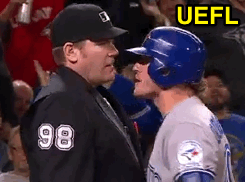This, of course, invites the disclaimer and reminder that the game participant label applies to the participant's role in the game, not the participant's personal off-field attributes.
Video as follows:
Alternate Link: White Sox and Yankees fight after Donaldson steps to the plate in the 5th (NYY/CCS)
These two teams' animosity stems from, amongst others, Josh Donaldson's physical play in pushing Chicago baserunner Tim Anderson off of third base earlier in May, a play featured as an Ask the UEFL video that highlights 3B Umpire Chris Guccione's success in both properly calling Donaldson for illegally forcing Anderson off his base and effectively diffusing a potential fighting situation through strong game management. Rewinding the tape even further, Donaldson was upset with a strike call Grandal got from HP Umpire Dan Bellino in 2020, when Bellino ejected Donaldson for actions intended to ridicule in kicking dirt on home plate after hitting a home run against Chicago.
Related Post: Ask UEFL - Anderson Safe After Donaldson Pushes Runner Off Base (5/14/22).
In studying the history of Chicago and New York's interdivisional bickering, we note that Donaldson appears to have historically been involved in other unsporting situations with other teams, as well as with umpires. For instance, Donaldson was one of our Top 10 MLB Hothead Players by Ejection Frequency in 2019, Donaldson's history of ejections—which doesn't include situations like the Anderson push or hard slide into second—suggests the possible presence in Chicago-New York of a player that would be classed as an adversary or abuser pursuant to the 2017 framework.
To review, the four types of game participants are allies, neutrals, adversaries, and abusers, with allies comprising the most helpful and cordial team personnel who work with officials to help a game run smoothly and help diffuse volatile situations, whereas adversaries and abusers provoke the vast majority of on-field problems, with abusers crossing a definitive sportsmanship boundary.
When a player further provokes animosity with the opposing team, they cross into perhaps a new category of disruptor, a label borrowed from basketball that runs ancillary to the four types described above.
Thus, a player who is both an abuser and a disruptor may routinely harass or otherwise cause problems—just a general air of hostile tension—as well as disrupt the game, perhaps due to this hostility, and perchance cross over into causing problems with their opponents as well. (Similarly a player can be both an apparent ally and a disruptor in that the player appears cordial with officials but routinely incites and provokes with the other team).
As we stated in 2017, "Although getting away from an abuser may temporarily halt the potentially unsporting behavior—and it is appealing to keep the ejection- or technical foul-gun in its holster—chances are that a future call that goes against the abuser's team will be met with an episode of greater harassment. Remember, intimidation or being made to feel guilty is a tactic of abuse and must be dealt with assertively. Bullies thrive on passive victims' behavior."
The key here is to rely on both psychological game management and situation handling techniques as well as application of book rules to support disciplinary and other mitigative measures to remove problem players (and/or coaches) from the game.
In New York, Crew Chief Greg Gibson sought fit to issue warnings rather than eject personnel. In Chicago, Guccione simply separated the two players and prevented further escalation. In 2016, Dale Scott ejected Donaldson for his active role during the Blue Jays-Rangers benches-clearing brawl, as did Brian Gorman in 2019 when Donaldson's Atlanta Braves fought with the Pittsburgh Pirates after Donaldson was hit by a pitch.
Officiate evenhandedly, or as the rulebook's General Instructions to Umpires section states, "be courteous, impartial and firm, and so compel respect from all." You might just find that once you eject a problem player, your game will all of a sudden appear to run much more smoothly.
Video as follows:
Alternate Link: White Sox and Yankees fight after Donaldson steps to the plate in the 5th (NYY/CCS)
















0 comments :
Post a Comment